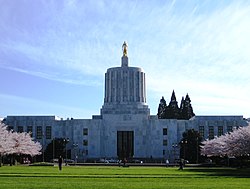The 56th Oregon Legislative Assembly convened for its regular session in 1971. The Democratic Party of Oregon held the majority in the Oregon State Senate, and the Oregon Republican Party held the majority in the Oregon House of Representatives. [1] Republican Tom McCall was the Governor of Oregon.
Contents
According to a biography of McCall, the two most significant legislative efforts during the session were the Oregon Bottle Bill, which passed, and a bill to "thwart migrant farm workers' attempts to form labor unions," which McCall vetoed. [2]
| 56th Oregon Legislative Assembly | |||||
|---|---|---|---|---|---|
| |||||
 The legislature took place in the Oregon State Capitol, seen here in 2007 | |||||
| Overview | |||||
| Legislative body | Oregon Legislative Assembly | ||||
| Jurisdiction | Oregon, United States | ||||
| Meeting place | Oregon State Capitol | ||||
| Term | 1971 | ||||
| Website | www.oregonlegislature.gov | ||||
| Oregon State Senate | |||||
| Members | 30 Senators | ||||
| Senate President | John D. Burns (D) | ||||
| President Pro Tempore | Harry D. Boivin (D) | ||||
| Party control | Democratic Party of Oregon | ||||
| Oregon House of Representatives | |||||
| Members | 60 Representatives | ||||
| Speaker of the House | Robert Smith | ||||
| Speaker Pro Tempore | Roger E. Martin (R) | ||||
| Party control | Republican Party of Oregon | ||||